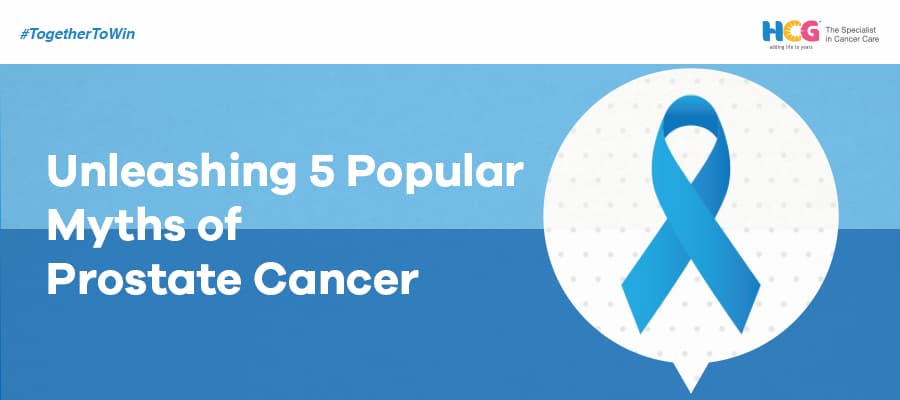
25 Jan, 2022

25 Jan, 2022
While it has been found after years of thorough research that there are 29 types of prostate cancer, the fact that prostate cancer is a topic which nobody talks about doesn’t change. This leads to a great amount of confusion and worry as not many know the true facts about this type of cancer and end up believing the myths that have been spread around. So, to break the miscommunication and to provide you real facts, here are 7 of the most popular myths on prostate cancer:
Myth 1- Prostate cancer is ALWAYS curable
Fact- When prostate cancer is diagnosed in the early stages, the rate of curing it increases. Whereas, if diagnosed after cancer has spread beyond the prostate, then the cure rate drops down by a great margin.
Myth 2: Surgery is the ONLY option for prostate cancer
Fact- Even though surgery for prostate cancer is the most popular option to date, there are some other effective treatments to go for. Radiation therapy, external beam radiation, brachytherapy, immunotherapy, and hormone therapy are some other options that are usually considered for their treatments.
Myth 3: You dont have prostate cancer if you dont have any symptoms.
Fact- Prostate cancer is one of the most asymptomatic tumors in oncology, meaning that not all men experience symptoms, and those that do are frequently misinterpreted or attributed to something else. Prostate cancer symptoms are frequently discovered by a doctor during a routine check-up. Some of the symptoms are difficulty in starting or stopping urination, the need to urinate frequently, pain or burning urination, constant pain or stiffness in the thighs, lower back, or hips.
Myth 4: I won’t develop prostate cancer as it doesn’t run in my family.
Fact: While having a family history of prostate cancer increases the chance of one developing it, inherited genes are not the only factor that determines ones development of Prostate Cancer. Multiple external factors usually influence the development of tumor such as age, geography, sexually transmitted diseases, smoking tobacco, obesity, etc.
Myth 5: A high PSA level indicates that you have prostate cancer whereas a lower PSA level says you don’t.
Fact: PSA (prostate-specific antigen) is a substance produced by the prostate that is found in an increased amount of blood in men who have prostate cancer. More PSA is released in the body when there is an issue with the prostate, and a PSA test is performed to identify PSA levels in the circulation. Although prostate cancer is the most common cause of high PSA readings, it is not the only one. BPH (benign prostatic hyperplasia - enlarged prostate) or prostatitis are two medical diseases that can cause elevated levels (an infection in the prostate).
Even though prostate cancer is not spoken about much, it carries a great amount of seriousness and criticality. That is why early testing and detection of prostate cancer will help the candidate with faster and effective recovery.